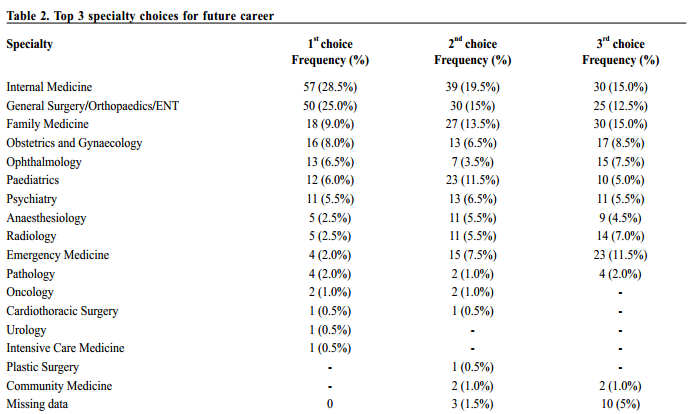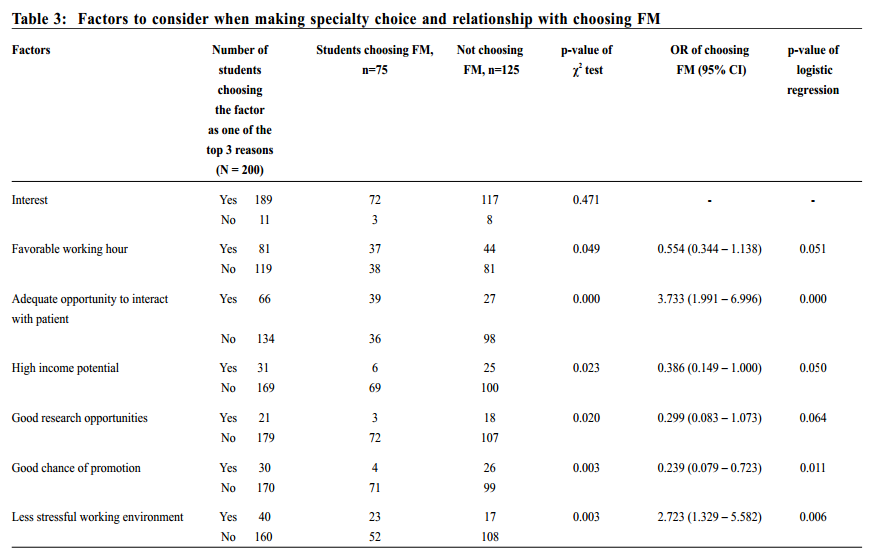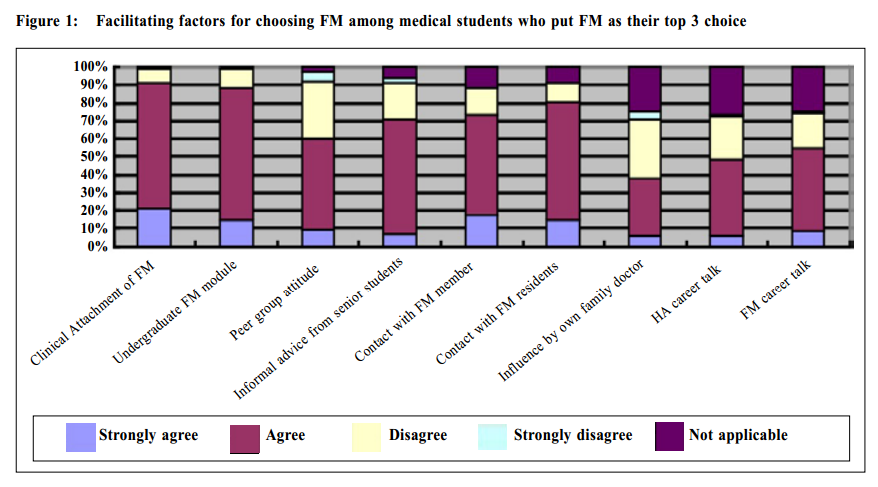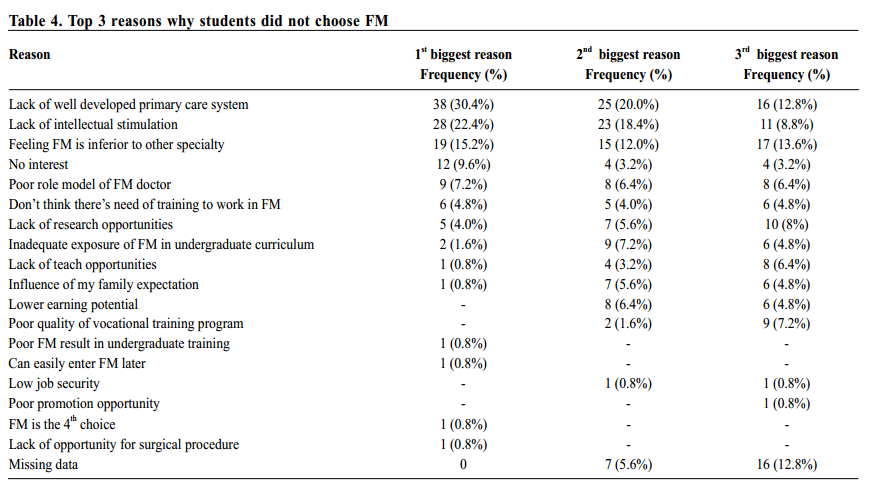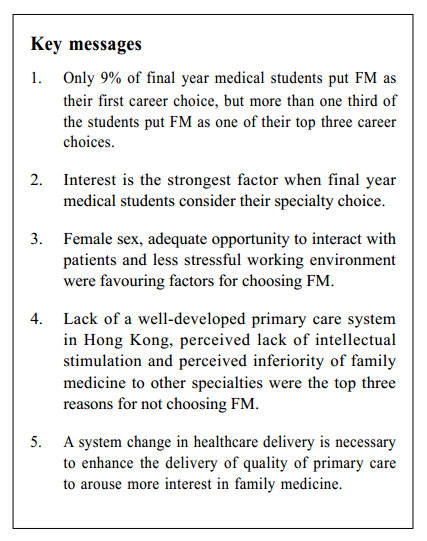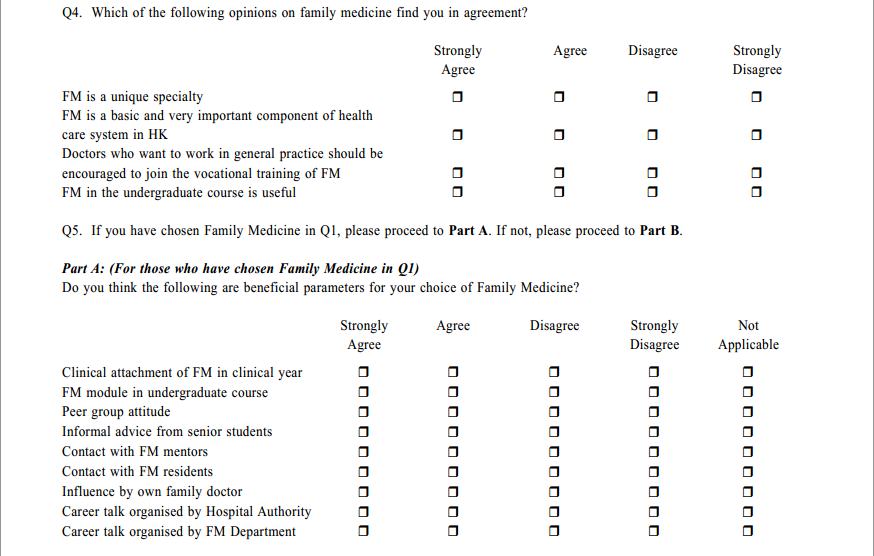
December 2014, Volume 36, No. 4 |
Original Article
|
A study on what influence medical undergraduates in Hong Kong to choose family medicine as a careerSM Wu 胡詩敏, TK Chu 朱晉傑, ML Chan 陳萬里, Jun Liang 梁峻, Julie Y Chen 陳芸, Samuel YS Wong 黃仰山 HK Pract 2014;36:123-131 Summary Objective: To evaluate the preferred medical specialties among Hong Kong’s final year medical students when they graduate from medical schools, and the factors they considered in making their choices, especially those associated with the decision of whether to choose family medicine, as a career. Design: A cross-sectional survey with anonymous self-reporting questionnaires Subjects: All final year (5th year) medical students from the University of Hong Kong and the Chinese University of Hong Kong. Main outcome measures: The top 3 specialty choices, the 3 strongest reasons to consider when students make their specialty choice, and the students’ opinion towards family medicine, the key influential factors for choosing or not choosing family medicine. Results: From an overall response rate of 94% or 200 valid questionnaires received, 18 (9%) respondents put family medicine as their first choice. Seventy-five (37.5%) included family medicine in their top 3 career choices. Interest was a major factor considered in the choice of specialty. Female sex (OR 2.264; 95% C.I. [1.276 – 4.016], adequate opportunity to interact with patients (OR 3.733; 95% C.I. [1.991 – 6.996]) and less stressful working environment (OR 2.723; 95% C.I. [1.329 – 5.582]) were factors independently associated with the choice of family medicine. Lack of a well-developed primary care system in Hong Kong, perceived lack of intellectual stimulation and perceived inferiority of family medicine to other specialties were the top three reasons which discouraged medical students from choosing family medicine. Conclusion: Family medicine remains the third popular choice of specialty for final year medical students in Hong Kong. Efforts to build up family medicine as a preferred career choice for medical undergraduates should be explored although it may take a system change in healthcare delivery that enhances the delivery of quality of primary care to arouse more interest in family medicine. Keywords: career choice, specialty choice, medical undergraduates, family medicine 摘要 目的: 評估香港醫科畢業生首選的醫療專業,以及影響他們作出選擇的因素,特別是與是否選擇家庭醫學(FM)的相關考慮原因。 設計: 自我報告的匿名問捲橫斷面調查。 對象: 所有最後一年(第五年)的香港大學和香港中文大學醫學生。 主要測量內容: 前3位的專業選擇,3大影響學生選擇專業的原因,學生對家庭醫學(FM)的觀感,選擇或不選擇FM主要考慮因素。 結果: 總回覆率為94%。200份有效問卷中,18(9%)位受訪者把家庭醫學作為他們的首選。75(37.5%)位,把FM括入其前3名的職業選擇。興趣是專業選擇的主要考慮因素。女性(OR2.264;95%CI[1.276-4.016],與患者互動的時間充足(OR3.733;95%CI[1.991-6.996])和工作環境壓力較小(OR2.723;95%CI[1.329-5.582 ])是選擇家庭醫學的獨立關連因素。香港缺乏發展良好的基層醫療系統,感覺專業知識的水準不夠高和認為家庭醫學較其他醫療專業地位低是阻攔醫學生選擇家庭醫學的三個最重要原因。 結論: 家庭醫學仍然是香港應屆醫科畢業生的第三熱門專業。應該努力去探索鼓勵醫科生以家庭醫學作為首選專業,雖然它可能需要醫療服務體系的改變,增強基層醫療服務的質量,以喚醒醫科畢業生對家庭醫學的興趣。 關鍵詞: 職業選擇,專業的選擇,醫學本科生,家庭醫學 Introduction A robust primary health care system is one of the key factors in providing cost effective and quality health care services to the population. However, it will be difficult to build up such a system without sufficient numbers of well-trained family doctors. Historically, family medicine (FM) has been an unpopular career choice among Hong Kong’s medical graduates1, 2 and recruiting medical graduates into FM residency training programmes have been difficult, especially when there were doctor shortages. This situation is not unique to Hong Kong. Australia, Canada, and the United States, which have strong primary healthcare systems, also encounter similar difficulties.3,4 To explore the reasons for this and to promote recruitment of medical graduates to work in FM, research has been conducted to study the demographic, attitudinal and educational factors affecting the choice of a specialty of medical students. However, due to cultural differences and variations in undergraduate medical training programmes, the findings of overseas studies might not be directly applicable to Hong Kong. There is also little data of relevance to the Hong Kong setting, with a literature review identifying only one unpublished cross-sectional survey studying the career choice of Hong Kong medical interns in 2010.2 The response rate of this survey was only 41%, limiting the study’s validity. Therefore, a local study is necessary to answer the following questions:
Methodology Study Population This was a cross-sectional survey study conducted on final year (fifth year) medical students of the University of Hong Kong (HKU) and the Chinese University of Hong Kong (CUHK), the only two universities providing undergraduate medical education in Hong Kong. Fifth year students were selected as the target population for this study because this group of students should have a clearer idea about their future career choices than younger years. Questionnaires The questionnaire was self-reported and anonymous. Questions were based on the validated National Physician Survey (NPS) led by the College of Family Physicians of Canada5 and a survey studying career choices of medical students in Greece in 2007 6, with minor modifications adapted for the local situation. Basic demographic data, top 3 specialty choices and 3 biggest reasons to consider when making specialty choice were asked. To assess students’ knowledge of the core values of FM, a question was designed based on the Greek questionnaire6 in which students were asked to choose the best definition of FM out of 4 choices. The best description was option (c) “Humanistic oriented approach of medicine with aims to prevent, treat and rehabilitate.” General questions about students’ opinion towards FM were assessed by a 4-point Likert scale. Respondents who chose FM as one of the top 3 specialty choices were invited to complete part A, which assesses the key factors influencing their choice of FM. Respondents who did not choose FM were invited to complete part B, which identifies the top 3 reasons behind this choice. A field test was conducted between May 2011 and June 2011 to evaluate the content validity and applicability of the questionnaire. Eight local medical students, either second year or fourth year, were recruited during their clinical attachments to a general outpatient clinic and were invited to complete the questionnaire. Their feedback on ease of understanding and difficulties in completing the questionnaire were collected and amendments were made accordingly. The questionnaires were distributed and collected in-person by the primary investigator between November 2011 and January 2012 during a scheduled whole class lecture. It was made clear during the informed consent process that answering the questionnaire was entirely voluntary, that anonymity was guaranteed and their answers would not affect their academic results. Ethical approval was granted by New Territories West Cluster Clinical & Research Ethics Committee. Statistical analysis Data were first analysed with descriptive statistics. Subjects were then divided into 2 groups according to whether they had put FM as one of their top 3 career choices. c2 test was used for categorical variables. Factors shown to be significant in c2 test were further analysed by logistic regression using FM as dichotomous outcome. A p-value < 0.05 was considered to be significant. Results 133 out of 141 and 114 out of 122 fifth year medical students in the CUHK and HKU returned their questionnaires respectively, giving a response rate 94.3% and 93.4% respectively. After excluding questionnaires with missing data in demography, career choice or reasons for career choice, 200 questionnaires were considered suitable for analysis, of which 54% were CUHK respondents and 46% were HKU respondents. Table 1 shows the basic demographic data of the respondents. The mean age was 23 years old (standard deviation 1.49, [range 21-30]). Female students were more likely to choose FM (p = 0.027). Students with family members working as doctors were asked to further specify the specialties that their family members work in. Thirty-four out of 37 respondents gave valid answers. Among them, 64.7% would choose the same specialty as their family member in their first 3 priorities. There were 5 students having family members practicing FM and all of them indicated that they would choose FM.
Table 2 shows the distribution of specialty choice. Internal Medicine and Surgery were the most popular choices. Family Medicine ranked 3rd with 18 out of 200 students (9%). 75 out of 200 students (37.5%) selected FM as one of their first three choices.
“Interest” was the strongest reason students considered when they chose their specialty, although this was no statistically significant related to choosing FM (Table 3). 81% indicated “interest” as their 1st reason and 94.5% of them put it as one of the top 3 reasons. Favorable working hours, high income potential and good research opportunities were not related to choosing FM after adjusting for sex in logistic regression. Adequate opportunity to interact with patients (OR 3.733; 95% C.I. [1.991 – 6.996]) and less stressful working environment (OR 2.723; 95% C.I. [1.329 – 5.582]) were significant predicting factors for choosing FM, while good chance of promotion was the significant factor for not choosing FM (OR 0.239; 95% C.I. [0.079 – 0.723]).
Among the 75 students who considered FM as their specialty choice, most of them agreed or strongly agreed that FM clinical attachment (n=67, 90.5%) and the undergraduate FM module (n=66, 88%) were facilitating factors. Only 28 students (37.3%) thought that their own family doctors influenced their choice. Results of other factors are presented in Figure 1.
Among the 125 students who did not choose FM, the most common reason was “lack of a well developed primary care system” (n=79, 63.2%), followed by “lack of intellectual stimulation” (n=62, 49.6%) and “feeling FM is inferior to other specialties” (n=51, 40.8%) (Table 4).
Discussion The low percentage of students (9%) choosing FM as a career is similar to a previous unpublished study on interns (8%).2 According to the discussion paper “Manpower Requirement and Strategies for Doctors” published by Hospital Authority in 2010 7, the annual intake requirement of FM doctors was 44 from 2010 to 2016. This number is expected to increase to 55 from 2022 to 2026. With such a low percentage of medical students putting FM as their first choice, and the expected parallel manpower shortage in other specialties, it is likely that there will be an increasing shortage of medical graduates to fill vacancies in FM training posts. Ultimately this will result in an insufficient supply of trained family physicians to meet service needs. Similar to previous studies8,9, female students were more likely to choose FM. It was postulated that traditional females might prefer a specialty with greater flexibility and regular working hours so that it would be more compatible with their domestic responsibilities. Unlike studies in other countries, which showed that older students preferred FM9,10, age was not a significant factor related to choosing FM in our study. The narrow age range among the study population indicates a relatively low proportion of students with a degree prior to their medical school entry, which differs from other countries where medicine is actually a graduate degree. In Hong Kong, only 7.5% of medical students possess a primary degree prior to their studying of medicine. Although the medical curricula between the University of Hong Kong and the Chinese University of Hong Kong were different, it did not show significant influence on students’ career choice on FM (Table 1). High family income or having family member working as doctor in other specialties were shown to be the negative factors of choosing FM in foreign studies.10,11 However, both factors were not shown to be related to choosing FM in this study. In contrast to overseas studies, students with family members working as FM doctors seemed more likely to choose FM. The difference may be due to different healthcare economic system in Hong Kong. Similar to other local and foreign studies2,6,12, lack of interest and intellectual stimulation were factors that were negatively correlated with choosing FM. It seems that students do not appreciate the breadth and depth of knowledge required for FM. Together with the need for a holistic, comprehensive and continuing whole person care, the intellectual stimulation is certainly equal if not over that of other specialties. Measures must be taken in order to arouse students’ interest in FM. This study highlighted that students value their undergraduate FM clinical attachments. Therefore the two universities, together with input from the Hong Kong College of Family Physicians, should consider further enhancing these clinical components. Another two major reasons that students did not choose FM were their related perceptions of an underdeveloped primary care system in Hong Kong and the inferiority of FM to other specialties. Without a sound primary care system, family medicine maybe undervalued by the general public, and the perceived “social status” of FM doctors will be lower. This can be discouraging for students who have interest in FM. If our government believes that a good primary care system is important to provide efficient and cost effective medical care to our citizens, more resources should be allocated for family medicine development. Acceptance of family medicine by the general public can also be enhanced by TV drama, newspaper articles, public health talks and public exhibitions showing the core spirit and value of family medicine. This study’s high response rate and the involvement of both universities are the main strengths of this study. However, findings cannot be generalised as only one year of students were selected. Further studies pre and post evaluation, as well as conducting further studies on future generations should be considered. Conclusion Family medicine was not a popular first choice among final year medical students, but more than one third of them considered it in their top three choices. In order to promote family medicine as a preferred career choice for medical undergraduates, measures to enhance undergraduate family medicine teaching and fostering research potentials in family medicine should be taken to let students understand family medicine better and arouse their interest. Acknowledgment: The authors would like to thank the final year students of Hong Kong University and the Chinese University of Hong Kong for their support and participation in the study.
SM Wu, MBChB, FHKCFP, FRACGP, FHKAM (Family Medicine) TK Chu, MBBS, FHKCFP, FRACGP, FHKAM (Family Medicine) ML Chan, MBChB, FHKCFP, FRACGP, FHKAM (Family Medicine) Jun Liang, MBChB (Glasg), MRCGP (UK), FHKAM (Family Medicine) Julie Y Chen, MD, FCFPC Samuel YS Wong, MD, FHKCCM (HK), FHKAM, FCFPC Correspondence to: Dr SM Wu, 26, Sai Tsing Street, Yuen Long Madam Yung Fung Shee General Outpatient Clinic, Yuen Long, Hong Kong, SAR, China. References
|
|

